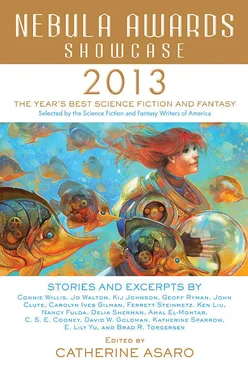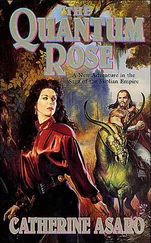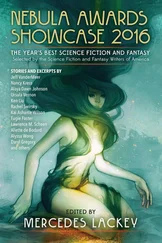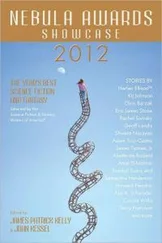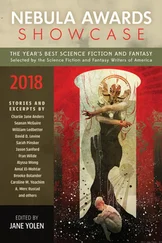Lizzie didn’t know how long she hung there, yelling like a madwoman; it felt like hours. But after too long a time it finally occurred to her: silly, just take off your clothes . And once she flung her shoes away, that gave her enough motion to thump against a doorway a minute or two later.
It was a childish mistake, the kind of thing Daddy would have laughed at her for. But the panic of that moment never left her. From then on, she strapped herself to the bed when she slept, and she always carried a small canister of oxygen so she could jet herself to safety.
Without gravity, going to the bathroom was an abominable chore, a filthy thing that contaminated the very air. The air stank of human waste and rotting sauerkraut. That made eating a precursor to horror, so she ate only when she grew faint from hunger. She stopped going to the observation deck because floating through the hallway’s splatters made her sick.
All she wanted to do was stay in bed. But what would happen to her muscles?
Things started to coalesce from the blackness.
At first it was little sparkles here and there, but the sparkles turned into constellations, and then firespark-white lines connected the dots to turn them into great silver airlocks. The airlocks hissed open. And as Lizzie pushed her way past the glowing doorways, she glided into a vast hydroponics chambers, the skies ribbed with water-pipes hissing down clean cool rain.
She looked down, and her fingertips brushed across waxy, familiar goodness; rows of cabbages floated below her. The cabbages danced joyfully, a strange and careful motion like two ships docking. Thousands of pale green heads bobbed beneath her fingers, like little men bowing.
She saw a flash of braided brown hair.
“ Themba! ” she cried.
“Play,” said Themba, his voice just as full of joy and life as always, and as his cornrowed skull dipped under the dancing cabbages, she realized that Themba was playing hide and seek with her. She launched after him, laughing—and rammed into a cabinet.
As she shook off the sting of it, the blackness swallowed her up.
She tried to tether herself to the bed, but in the darkness she heard scuttling things coming for her. She felt fine hairs brushing against her skin, hoping to find an anchor on her flesh to drill deep.
She shrieked, and the walls of the station fell away, and she was walking on the panels of the outside hull.
Daddy walked with her.
His desiccated hand was all rattly inside his punctured spacesuit, but he held her wrist like they were going for a walk around the corridors back in the good old days. Lizzie didn’t have a suit, but that didn’t matter; it was a beautiful day. She closed her eyes, felt warmth of the sun on her face.
“You’re dying, Lizzie,” Dad said.
“I know,” Lizzie shrugged.
“It’s only been two weeks.” His face was smashed in like a crushed cabbage—but still kind. “You gotta be strong. Trust me, Lizziebutt, I know what you’re going through.” He gestured up to point at himself, a dot far out in space.
“Aw, Daddy,” Lizzie said, hugging him tight. Her squeeze sent a puff of dry, dead air shooting out through his cracked faceplate.
“It’s no good hugging you any more, Daddy,” she said.
He nodded. “Only the living can give comfort,” he said. “That’s why you gotta stay alive, Lizziebutt.”
“But you came for me,” she protested.
“That’s cause I know how empty things are. You’ve been doing this for just fourteen days; I’ve been out here five years. But I wouldn’t be out here drifting if I hadn’t screwed up. I lost my footing, and drifted out, and wham—I was gone. You know how hard it is to get a glimpse of you only once every seven weeks?”
“I miss you, Daddy,” she said, laying down on the panels and closing her eyes. “It’s nice here.”
“You gotta do stuff, Lizzie. Or you’re gonna go crazier than you already have. So I’m gonna make things worse to give you something to do. It might kill you, too. But what wouldn’t, these days?”
Daddy knelt down and swept her up in an embrace, then he leapt off like a ballet dancer to launch himself into space. He whirled around like a gyro and flung Lizzie back into the station.
She busted through the hull with a horrible pong noise, and there was a hiss as all the air came whooshing out, and Lizzie realized that she was struggling against her bedstraps.
There was new light in here. A sliver of stars, shimmering behind a fluttering stream of purple.
Something had broken through the hull.
A very real hissing came from a finger-sized hole on the wall. A meteoroid had punctured the alloyed metal like a bullet fired from space. If that meteor had gone three feet to the right, it would have punctured Lizzie’s stomach.
She reached down for the emergency sealer-patch under her bed with the familiarity of practice of years of hull breach drills. She turned on the flashlight, and her head exploded; the light made her just as blind with white as she’d been blind with black.
As she slapped the sealer on, she peered out the gap; the plasma hummed. The shields were holding.
So why had a meteoroid made it through?
When she was done, she floated back to the observation deck. It was almost too bright to see now, a strobing purple.
How could she have ever thought it was dark? It was radiant in here.
But looking out the window, she saw meteoroids sizzling against the shields. There was maybe one a minute— way more than usual. She pressed her face to the window, trying to see what looked different.
Sure enough, Daddy’s bear-constellation had slipped off the side of the window, and she could only make out the top three stars of Great-Gemma’s turbine-constellation. If the stars were changing position, then the station was drifting off-course—through the fringe of the dust belt and into the nearby asteroid belt. The shields were designed to burn off small inbound particles… But large ones would still penetrate. Without thrusters to prevent her from drifting into the denser part of the belt, the shields would fail.
* * *
Lizzie tried to get the thrusters back on-line, but it was no use; even if she’d had enough fissionables to start a reaction, the reactor itself was laced with yards of blown-out circuitry. She’d thought about controlled hull breaches, maybe jetting her way to safety with air, but some calculations scrawled on a filthy whiteboard showed her that the displaced air wouldn’t be enough to significantly affect the station’s mass. And even if she could have moved the station, she didn’t have a clear idea which way the ship was drifting. She might knock it deeper into the field.
All her life, Momma had taught her that everything came down to guts and brains, but this put the lie to it: she was dice rattling around in a cup, her life determined by sheer randomness. Nothing she had could prevent the larger meteoroids from breaking through. Every punk! meant that a rock had blown through the hull, and by sheer dumb luck it hadn’t blown through her.
It was like trying to drift off to sleep with a gun pressed against your stomach.
Lizzie pulled herself around the station in an exhausted haze, her arms aching, trying to make herself a moving target. The station seemed to expand and contract at will, the sign of some malicious intelligence; at times it felt like a vast dock and she was a bat, fluttering madly around inside emptiness. Other times it was all walls, and the space outside compressed in. Sometimes she’d fall asleep in mid-pull and not even realize it until the next ponk woke her up.
Ponk . She’d survived. Again.
Читать дальше
